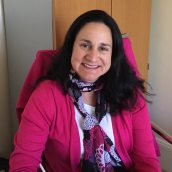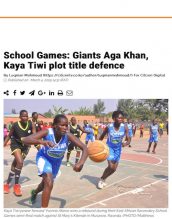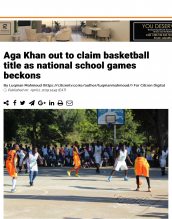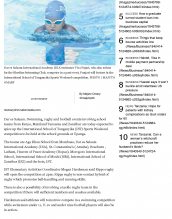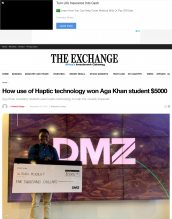Aga Khan: Bridging the Divide, Embracing One and All
Kimani Chege features the work of His Highness the Aga Khan to mark the end of the Diamond Jubilee year.

Theresa Urist: A passion for education
An Interview with Theresa Urist, Global Director of University Counselling at the Aga Khan Academies
Theresa Urist has always loved to learn. Growing up in a rural community in New York state, where many of her classmates did not go on to college, her thirst for education led her to Stanford, where she earned a B.A. with Honours in American Studies and tutored high school students in her spare time. She realised that she loved teaching as much as she loved to learn, so she secured a spot in the Master of Education programme at Harvard University before becoming a high school teacher and, later, a university counsellor.After more than two decades as a counsellor in the United States, where she directed college counselling at three different schools, Theresa’s desire to support students from poor communities led her to the Aga Khan Academies, where she became the Global Director of University Counselling in 2015. Her role is essential to the mission of the Academies, which aim to produce effective, ethical leaders with the skills and knowledge to support positive development in their societies. As the networks’ university expert, she coordinates the university counselling process so that the students are admitted to and select universities where they will flourish in their chosen fields.
Aga Khan Academies writer Alia Dharssi sat down for a conversation with Theresa about her passion for education, her work at the Academies and what makes her tick. Their conversation has been edited for clarity and length.
Alia: Can you tell me about yourself and how you wound up becoming a university counsellor?
Theresa: I was born and raised in a very small town on Long Island in New York State. I wanted to be a journalist as a kid and wound up writing for my college daily newspaper, where I had a 1am news deadline. It was crazy and frenetic. I realised that’s not what I wanted to do, but I had also begun tutoring at a nearby school and I really, really loved working with the students. That experience put me in the direction of education. I earned a Masters of Education from Harvard and became an English and history teacher. In 1995, I answered the call to become an interviewer for Harvard undergraduate admissions. I loved talking to students about their future plans and goals during the interviews, so I put the pieces together and entered the field of university counselling.
Alia: What makes you passionate about education?
Theresa: The way I see it, education is the key to social mobility. When students – like the ones on full financial aid at the Academies who are selected through our talent identification programme – become educated, it’s something that doesn’t just benefit them. It benefits their family and their community and has a ripple effect. I see it as a way that entire communities can get themselves out of poverty in one generation. Education is the most concentrated way you can effect lasting social change. That’s what gets me up in the morning every single day to do the work that I do.
Alia: Have you always thought about education in this way?
Theresa: Education is always something that has been at the forefront of my mind. My parents were well educated, but I grew up in a very rural community where a lot of people had not studied beyond the secondary level. So, when I went off to university at Stanford 3,000 miles away from home, it was an eye-opening experience. I was surrounded by very motivated people with a lot of interesting ideas. I had been a big fish in a little pond in my secondary school because I was somebody who was very hungry for education. I tried to access a lot of educational opportunities despite the fact that I attended a regional, rural public high school that did not offer the most enriching academic experience. College was the first time in my life I was surrounded by students who had had very different life experiences, who had gone to schools that were very academically rigorous, who were incredibly curious. It was vibrant and transformative.
Alia: That sounds like an amazing experience. You started working at the Academies after two decades of working as a counsellor in the US. What inspired you to take the job?
Theresa: When I heard about the job, it seemed like a perfect fusion of my interests. The mission of the Academies in terms of providing educational opportunities for students regardless of their means is one that spoke to my heart. In two decades of counselling, I had gone from working in college prep, private schools to working at an urban public school with very low-income students. There are so many talented kids whose socioeconomic background prevents them from accessing very good academic opportunities in places where they’re going to flourish. And so, in my own job search, I was looking for an organisation that provided such opportunities for students in need. I was also interested in international education – in addition to being a US citizen, I’m also a Swiss citizen and I’ve spent a good amount of time overseas – so this position really spoke to me.
Alia: What kinds of struggles have you seen students from poor socioeconomic backgrounds face when it comes to getting a good education?
Theresa: In my last role in the US, I was working in an urban public charter school with low-income students from all over the world. The majority of my students were first generation, meaning their parents had immigrated to the US. They did not speak English at home and they would be the first in their families to access higher education. I helped them navigate the system. Many of their families came from countries where poverty was a problem. Just getting to the US was a big hurdle. In addition, education is very, very expensive in the US, so it was a challenge for those students to figure out how to finance their education.
Alia: That sounds quite different from your role at the Academy. How do the two experiences compare?
Theresa: I certainly have a lengthy background in university counselling, but when I was based in one single school, it was quite limiting in a lot of ways. My work at the Academies requires a much larger scope in terms of finding what universities are a best fit for particular students. I had good working knowledge of US and Canadian schools coming in. What’s newer for me is some of the other schools beyond that, particularly schools in the UK. It’s given me a greater global perspective on education in terms of the different programmes that exist and the ways in which universities are trying to position themselves globally.
Alia: Can you tell me about your trips to the Academies? What was your first impression?
Theresa: My first visit was to Hyderabad. I found the students compelling and the facilities stunning. Everything exists in the service of students and forwarding their academic and personal growth. When I first made a visit to the Mombasa school, I found the level of arts that students were doing and the level of introspection that went into what they were creating was incredibly deep and heartfelt. It was more advanced than what I’d seen at other schools. A lot of the students’ art projects dealt with issues of social justice and presented very clear messages that made me hopeful. Seeing that level of attention given to something that is often peripheral at other schools speaks volumes about the Academies.
Alia: Absolutely. Why is your role important to the Academies’ vision?
Theresa: As we grow as a network, we want to make sure we are offering a consistent quality of university counselling services across campuses, so that’s a really important part of my work. We want colleges and universities across the globe to know who we are and why they should admit our students and fund them, so a big part of my job is conducting outreach to universities and colleges. When a university takes a risk on a student and that student does well, then it knows that it has a viable academic candidate and will admit more and more students from our schools. My job is to try to create pipelines for students at academically rigorous universities that recognise who we are and why our students are so interesting and compelling.
I also conduct some professional development like workshops for faculty members where they receive training about best practices for writing recommendations for students. Both campuses are now on the Naviance platform, which is an online portal that allows students to track all their applications and send documents to universities electronically. We also track data on the admissions process on the platform.
Alia: That’s important work, but now for a less serious question. What do you do when you’re not busy counselling?
Theresa: I love to cook and bake. In particular, I like making fancy cakes and tortes. Every year, during the holidays, I create a gingerbread house. They’re not basic ones; I have architectural plans. Last year, I made a church with candy stained glass windows. The year before, it was a Victorian house. Every year I do a different structure.
Alia: That’s quite a hobby. Do you eat the houses?
Theresa: Yes, eventually I do. My friend’s kids help me decorate the house, it stays up and then it gets destroyed. So that’s one of my hobbies. To balance my baking interests, I was a distance runner and had run a bunch of marathons, but I had to stop after an injury. But I still really like to be active. I like hiking and skiing and being outside.
Alia: Is there anything else you’d like to say?
Theresa: I love the work I do. I feel like mine is a really important role, so I’m just very grateful for the opportunity to work on behalf of the Academies.
The Daily Siasat reports on AKA,Hyderabad's first graduating class
Upon graduation on 24thMay 2014, students from Aga Khan Academy (AKA) Hyderabad will continue their educational journeys at some of the world’s most reputed post-secondary institutions.
Members of this year’s graduating class have received offers from top-ranked universities in Canada, India, the United Kingdom and the United States. McGill University and the University of British Columbia (UBC) in Canada, and New York University (NYU), the University of California, Los Angeles (UCLA) and Purdue University in the United States, as well as the universities of Warwick and Southampton in the United Kingdom are amongst the many that have offered admission to members of this year’s graduating class.
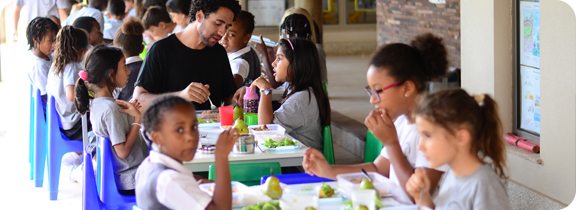
Terms and Conditions of Use of the agakhanacademies.org Website
1. Welcome
Welcome to the agakhanacademies.org website (the “Site”) of the Aga Khan Academies, which are part of the Aga Khan Education Services, an agency of the Aga Khan Development Network (“AKDN”). The Site is owned and operated by the Aga Khan Foundation (the “Foundation”). These terms and conditions govern your use of the Site. Please read them carefully. If you do not accept these terms and conditions of use, please do not use the Site. By using the Site, you agree to abide by the following conditions of use.
2. Content Rights
The copyright and all other rights in all of the material on the Site are owned by the Foundation, other members of the AKDN, related entities or third parties (hereinafter “Rights Owner” or together “Rights Owners”). All materials on the Site are presented with the permission of the Rights Owners. The content includes photographs, images, databases, and other audio-visual material, the copyright in which is owned by the Rights Owners and, as regards Rights Owners other than the Foundation, licensed to the Foundation for display on the Site.
Unless otherwise stated, all materials on the Site may be reproduced for non-commercial informational and educational purposes without permission, provided that (i) due acknowledgement is given to the Foundation or relevant Rights Owner, (ii) no modifications are made, (iii) and all copyright legends and notices are displayed in the same form and manner as on the original. Material may only be used in the language displayed on the Site. You may not adapt, alter or create any derivative work from any of the content of the Site, without prior written permission of the relevant Rights Owner or Rights Owners. You may not republish, distribute, sell or make any other commercial use of the content, without prior written permission of the Rights Owner. You may not retrieve content from the Site to create or compile, directly or indirectly, a collection, compilation, database or directory (whether through robots, spiders, automatic devices or manual processes), without prior written permission of the Rights Owner. You may contact the Foundation at: Aga Khan Foundation, 1 – 3 Avenue de la Paix, 1211 Geneva, Switzerland, data.protection@akdn.org.
You may not republish, distribute, sell or make any other commercial use of copyright material owned by a third party, without the prior written consent of that party, and such consent must be obtained directly. For avoidance of doubt, the Foundation does not represent nor does it act as an agent for these parties.
Nothing contained herein shall be construed as conferring any license in respect of the material, other than its reproduction as stated above.
All opinions expressed in any articles or other authored material on the Site are those of the respective authors themselves and do not necessarily represent the views of the Foundation.
The Site may contain links to other websites, which are not reviewed or controlled by the Foundation. The Foundation shall not be responsible for the content of any such websites nor for the terms of use applicable to the content of any such websites. You are solely responsible for any access and use of any such websites. It is your responsibility to consult the terms of use published on any such websites and to abide by them.
3. Use of the Site
You may only use the Site in accordance with these terms and conditions and for lawful and proper purposes.
The Site is provided to you on an “as is” basis. There is no guarantee that the Site or any content is error-free, suitable for any particular purpose, accurate or up-to-date. You are entirely responsible for your use of the Site, and for the consequences of relying on any content. You are advised to verify the accuracy of any information before relying on it.
The downloading or other use of the material on the Site is done at your own discretion and risk, and with your agreement that you will be solely responsible for any damage to your computer system, loss of data, or other harm that may result from such activities.
To the full extent allowed by applicable law, you agree that the Foundation will not be liable to you for any such damage or loss that may arise in connection with or as a result of your use of the Site, or in connection with your use of other websites linked to the Site.
Your access to the Site may be suspended, blocked or terminated at any time without prior written notice thereof.
4. Names Acronyms Symbols and Logos of Rights Owners – Use of Trade or Service Marks
The names, acronyms, symbols and logos appearing on the Site are owned by the respective Rights Owners and are protected. You shall not use or adapt any such names, acronyms, symbols and logos, nor imply that you are connected or associated with them, unless you have obtained the prior written permission of the Rights Owner. You may contact the Foundation at: Aga Khan Foundation, 1 – 3 Avenue de la Paix, 1211 Geneva, Switzerland, data.protection@akdn.org.
The use of trade or service marks on the Site is consistent either with the usage policy or with the consent and permission of the Rights Owner.
5. Privacy Policy
Please read the privacy policy (below) which also forms part of these conditions of use. You have the right at any time to access, rectify and/or delete your personal data (and that of the person or persons for whom you act as legal representative) by sending an e-mail to data.protection@akdn.org or contacting the Foundation at: Aga Khan Foundation, 1 – 3 Avenue de la Paix, 1211 Geneva, Switzerland.
6. General Conditions
The information and material on the Site may be edited, improved, modified or changed at any time, without notice. The Site may be terminated at any time, without notice.
These terms and conditions of use may be modified from time to time, and any such modification shall be effective immediately upon posting of the modified terms and conditions of use on the Site. Accordingly, your continued access or use of the Site is deemed to be your acceptance of any such modified terms and conditions.
If you breach any of these terms and conditions, authorisation to access and use the Site will cease and terminate, and any material downloaded or printed from the Site in violation of the terms and conditions must be immediately destroyed.
If for any reason a court of competent jurisdiction finds any provision of these terms and conditions to be unenforceable, that provision shall be enforced to the maximum extent permissible and the remainder of the terms and conditions shall continue in full force and effect.
Any failure to enforce or exercise any right inherent in any provision of these terms and conditions, or any related right thereof shall not constitute a waiver of that right or provision.
The ordinary courts of Geneva shall have exclusive jurisdiction to settle disputes arising out of or in connection with these terms and conditions (including the privacy policy). These terms and conditions (including the privacy policy) are subject to and governed by Swiss law (including the Berne Convention for the Protection of Literary and Artistic Works).
Privacy Policy
This privacy policy constitutes an integral part of the terms and conditions of use of the agakhanacademies.org website (the “Site”), which is owned and operated by the Aga Khan Foundation (the “Foundation”). It describes the ways that the Foundation undertakes to protect your personal data (and that of the person or persons for whom you act as legal representative) (the “Personal Data”), the way in which we collect information from you when you use the Site and for what such data may be used. This privacy policy applies to any information obtained by the Foundation through your use of the Site. It is not applicable to any internet websites controlled by third parties that the Site may link to (“Third Party Sites”). Please review the privacy statements of Third Party Sites, as the Foundation is not responsible for and has no influence on the content or the privacy practices of Third Party Sites.
1. Personal Data is collected from you in various ways.
From time to time, there may be projects, programmes and services which may allow you to provide Personal Data to us via the Site. By providing Personal Data, you are consenting to the Foundation’s use of the Personal Data, and you consent that the Foundation may disclose this information to other members of the AKDN and related entities or to third party providers, inside or outside your country of residence, for data processing. You also consent to the retention of this Personal Data.
In particular, your Personal Data can be collected as set out in the Appendix to this privacy policy.
You are entitled to a copy of your Personal Data and to have it rectified or deleted as required by applicable data protection legislation. Should you have any concerns or requests regarding your Personal Data, you may send an e-mail to data.protection@akdn.org. Please note it may take some time to process your request and to cancel your participation, if this is requested. During any such period your Personal Data will still be available on the Site. We will endeavour to amend or remove your information from the Site as quickly as is reasonably possible.
2. No one under age is allowed to enter any Personal Data or otherwise communicate with the Site, unless the legal representative or representatives of the minor (generally the minor's parents or parent) and us formally consent in advance. Personal Data entered by a minor unbeknownst to us without such consent will be deleted from our database as quickly as possible after we become aware of the fact.
3. We use appropriate technical and organisational security measures in order to protect Personal Data against unauthorised access, accidental or intentional manipulation, loss and destruction.
4. The Internet is a global environment. In order to administer the Site, we may need to transfer Personal Data to locations outside the European Economic Area (the “EEA”) and process Personal Data in locations outside the EEA. The level of data protection offered in such jurisdictions may be less than that offered within the EEA. By clicking “subscribe”, “submit”, “log in” or “submit by e-mail”, as the case may be, or any other such term which results in you sending us Personal Data, you accept this privacy policy and you consent to such transfers.
5. The Foundation may disclose Personal Data when required by law or regulation or in the good faith belief that such action is necessary in order to conform to the edicts of the law, comply with legal mandates, or to protect the rights, property, or personal safety of personnel of the Foundation, other members of the AKDN, related entities, the Site’s users and the public.
6. The Site uses “cookies” (text files) which will be saved on your computer and which will allow an analysis of your use of the Site. This information will be used to compile reports about the Site activities for the Site operator and will facilitate provision of additional services in relation to the Site and internet utilization. If you do not wish to receive “cookies”, you may set your web browser to reject these, if your browser so permits.
7. The Site keeps track of user activity via log files stored on our web servers. The log files include information on IP addresses, browser types and versions, pages viewed, and entry and exit paths. Log files assist us in offering a personalised Web experience, diagnosing server problems, administering the website and tailoring information for the end-user.
8. When we send you emails, we may include a Web beacon to allow us to determine the number of people who open our emails and the links on which they click. Web beacons can be refused when delivered via email. If you do not wish to receive Web beacons via email, you will need to disable HTML images in your email software.
9. By using the Site, you acknowledge that you have read the terms of this privacy policy and that you consent to our use of data for the purposes set out above. This privacy policy may be amended from time to time and any changes will be posted on the Site and will become effective when posted.
10. Should you have any concerns or requests regarding your Personal Data, please send an e-mail to data.protection@akdn.org or contact the Foundation at: Aga Khan Foundation, 1 – 3 Avenue de la Paix, 1211 Geneva, Switzerland.
APPENDIX
You have the option on the Site:
- of subscribing to the Aga Khan Academies Newsletter (the “Newsletter”). In registering your name and e-mail address, you are providing your Personal Data to us via the Site. By clicking “join now” or any other such term which results in you sending us Personal Data, you are consenting to the Foundation’s use of your Personal Data to enable the Foundation to send you the Newsletter, from time to time. If you wish to cease receiving the Newsletter, then click “unsubscribe”.
- of applying for a place at an Academy. In filling out the forms, you are providing Personal Data to us via the Site. By clicking “submit” or any other such term which results in you sending us Personal Data, you are consenting to the Foundation’s use of your Personal Data to enable the Foundation to give you the requested information. You consent that the Foundation may disclose your information to third party providers, inside or outside your country of residence, for data processing.
